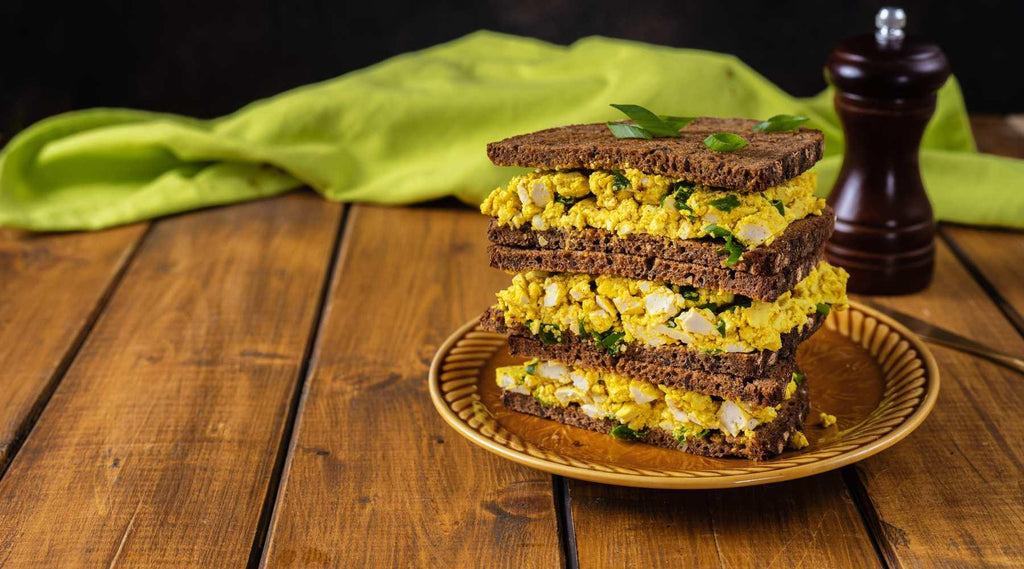
Eggs. Eggs. Eggs. There’s nothing like ‘em! Potentially the most versatile ingredient of all time, no other food holds the potential for so many delicious dishes, from classic cakes to epic breakfasts!
Whether you want an omelet, an egg sandwich, or a meringue, eggs hold the answer - which is exactly why they are a tricky thing for vegans to miss out on. They are the key ingredient in so many foods and it’s hard to find an alternative that covers all of these bases!
But, it’s not like us vegans to go without, is it?
*Enter vegan eggs*
Vegan eggs do exist, you just need to know how (and when) to use them. Here’s your ultimate guide to vegan eggs, including all the information you need about what vegan eggs are, which are the best vegan eggs, and exactly how vegan eggs are different from regular eggs!
What are vegan eggs?
What are vegan eggs? You may think the answer is obvious - eggs that are vegan. But, trust us, there’s a lot more to it than that. Unfortunately, vegan versions of eggs don’t grow on trees, which is why we vegans have had to take matters into our own hands and invent vegan ‘egg’ alternatives that find new ways of hitting the same old spots.
And, because a normal egg hits so many spots - being everything from a breakfast staple to a baked good essential - there is not one vegan egg alternative to cover every egg base. Instead, there are lots of vegan egg alternatives!
Vegan egg alternatives have been innovated from chia seeds, flax seeds, aquafaba, mung beans, pea protein, apple sauce, and even tofu! Each of them has its own texture and taste, making them the perfect egg replacement for specific uses. Read on to find out more!
What can I make with vegan eggs?

As we mentioned, each vegan egg alternative has its own function. Therefore, what you should make with your vegan egg depends on the vegan egg alternative that you are using. For example, a flax seed or chia seed egg makes a fantastic egg-like binding agent when baking. However, if you try and put a flax seed or chia seed egg in a pan to whip up an omelet, you will be disappointed! Similarly, while aquafaba may be great for making vegan mayonnaise or vegan crepes, it won’t work for a boiled egg sandwich.
Our advice? If you are craving some egg, whether on its own or in a recipe, do some research, and pick the best vegan egg alternative for what you are after. Or, you can browse through our hand-selected range and get your vegan eggs delivered straight to your door!
What do vegan eggs taste like?
The taste of vegan eggs depends on what it is made from. Some vegan egg alternatives are created to replicate the taste of eggs, especially when they are cooked up into a breakfast scramble. However, other vegan egg alternatives may not taste anything like an egg! This is because many vegan eggs are designed to recreate the texture of the egg, rather than the taste.
Take chia or flax seed eggs for example. As you might guess, chia and flax seeds combined with water do little to recreate an egg taste. However, when used in baking, they replicate the binding quality that egg has in almost any recipe! Other alternatives, like tofu or apple sauce for example, also have their own unique taste.
What are the best vegan eggs?
With lots of different types of vegan eggs available, when you are picking an egg alternative there are lots of options to choose from. Here are some of the key names of the best vegan eggs you can get your hands on right now.
1. Chia or Flax Seed Egg
A chia/flax seed egg is made by combining 1 tablespoon of either chia or flax seeds (milled or whole) with 3 tablespoons of water. Leave this mix for 5 minutes and it will thicken up into a gloopy egg substitute which can act as a binding agent in all of your favorite baked goods recipes.
2. Aquafaba
You know that water leftover in the chickpea can that you normally chuck away? Well, it turns out this chickpea water makes a fantastic egg alternative. Not only is aquafaba a great option for baking and cooking, but it can even be used to make vegan meringue or mayonnaise, thanks to its ability to fluff up, just like a real egg! Aquafaba can be drained from a can of chickpeas or bought as a powder.
3. Tofu
Tofu?! Yes, tofu. It may not seem like an obvious vegan egg alternative, however, in certain recipes, versatile tofu can be cooked in a way that gives off a real egg effect. Scrambled egg is a key example. With the right herbs and other add-ins, tofu can be scrambled into a great breakfast option, which may not taste exactly like real egg, but hits the same spot.
4. Apple Sauce
Looking for another vegan egg for baking? Try apple sauce on for size! The thick, sticky texture of apple sauce makes for a great thickening and binding agent in cooking, especially in baked goods. But, remember - apple sauce will bring added sweetness to your recipes, so maybe go easy on the sugar.
5. Ready-made vegan egg
On top of all of these alternatives, vegan brands have also been innovating other fantastic vegan egg options. For example, Crackd’s ‘No-Egg Egg’ made from pea protein or Just Egg’s Liquid Egg made from mung bean protein. Both can be used just as you would a normal egg! If you fancy a pre-made vegan egg snack, simply opt for Just Egg’s Sous Vide Plant-Based Egg Bites!
What is the difference between vegan eggs and regular eggs?
Normal eggs come from chickens, vegans eggs do not. But, aside from this obvious difference, what else sets vegan eggs and regular eggs apart? Let’s unpack it!
1. Versatility
As we mentioned, while regular eggs are a one-size-fits-all solution to all of your egg needs, the world of vegan eggs is made up of lots of different egg alternatives that have their own uses. This means that vegan eggs are more diverse and versatile, allowing you to discover all kinds of culinary possibilities!
2. Environment impact
While chicken egg production has a much smaller carbon footprint than other forms of animal production, this does not mean it has no impact. Firstly, chicken egg production can result in high levels of water pollution, as waste manure infiltrates water systems. Secondly, this manure can also increase the risk of humans living and working in the area contracting an illness as well as increasing the risk of respiratory ailments among the livestock.
Both of these environmental impacts can be avoided by opting for a vegan egg source, which involves no manure, and therefore avoids these risks!
3. Nutritional value
What about nutritional factors? In general, vegan eggs have one important benefit compared to regular eggs: they contain no cholesterol. Normal eggs have a high cholesterol content, which means that if they are consumed too often, they may start to affect your health. Vegan eggs avoid this risk. However, as vegan eggs vary so much, their nutritional benefits also vary a lot too, so this must be considered before tucking in!
4. Animal welfare
The final significant difference between vegan eggs and regular eggs is the cruelty factor. Regular eggs are most often produced by mass poultry farming. This means cramming thousands of birds into unsanitary conditions which are often inhumane. The best thing about vegan eggs is they are a delicious alternative to regular eggs, that are totally cruelty-free!
Final words…

The long and short of it? Regular eggs have their advantages. They’re convenient and people have been eating them for centuries. But, vegan eggs are here to stay. Environmentally friendly, versatile, and nutritious, this totally cruelty-free option is much loved by vegans across the world! And, with so many ways to enjoy vegan eggs, there’s no time to waste. It’s time to get eating!






